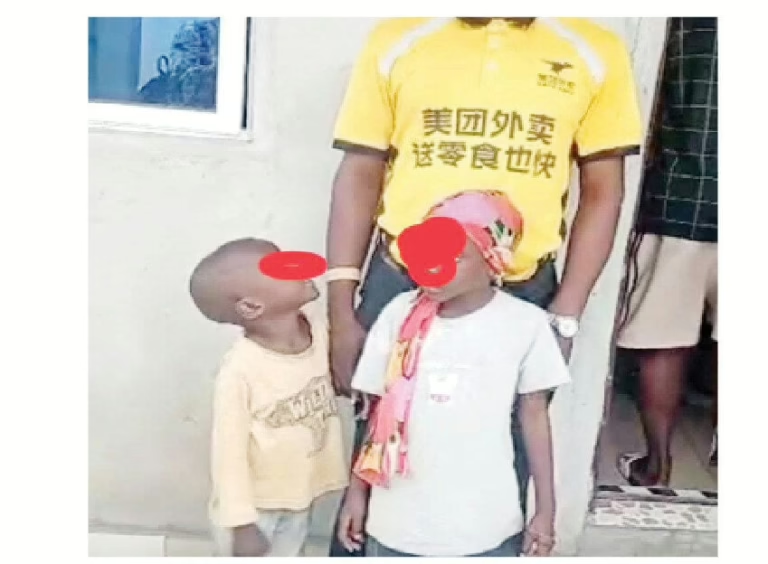From the vibrant urban centers of Lagos to the agricultural landscapes of Benue, and stretching from the waterways of the Niger Delta to the outskirts of Kano, the incidence of child abandonment is escalating at a distressing pace. Frequently, these vulnerable children are found in dire conditions-wrapped in tattered cloth or plastic, discarded as if they were refuse.
While teenage pregnancies have historically been the primary factor linked to child abandonment, the situation has deteriorated significantly. Even married couples, especially in Rivers State, overwhelmed by unemployment, hunger, and despair, are resorting to abandoning their children as a desperate plea for relief.
According to LEADERSHIP Sunday, the deteriorating economic climate has forced many parents to prioritize survival over parental responsibilities. With inflation soaring, widespread joblessness, and minimal social welfare support, countless mothers and fathers find themselves pushed to the brink. Although abandonment is indefensible, it often reflects systemic failures within a society struggling to protect its most vulnerable members. Each abandoned child embodies a narrative of suffering and serves as a stark reflection of societal distress.
Despite the harsh economic realities, one must question the justification behind a mother, who nurtured a child for nine months, choosing to forsake that child without regard for the perilous dangers ahead. In a nation where threats from kidnappers, ritualists, and organ traffickers are pervasive, how can a parent abandon their child, fully aware of the unimaginable risks involved?
In a recent poignant episode, Apostle Chibuzor Chinyere, founder of Omega Power Ministries (OPM) in Port Harcourt, shared a sorrowful account of having to turn away two abandoned children brought to his church due to limited capacity.
He revealed that the children were directed to the Special Area Police Division in Rumuokoro, Port Harcourt, where their father later appeared, explaining that their mother had left them behind, overwhelmed by the crushing economic pressures.
Apostle Chinyere emphasized that his ministry has long served as a sanctuary for abandoned and disadvantaged children, operating free educational institutions and providing scholarships through university. Nevertheless, he admitted that the growing number of abandoned children is an immense challenge.
Currently sheltering over 500 children in his home, Apostle Chinyere lamented that this is not an isolated incident. With a voice heavy with emotion, he appealed for increased societal and governmental assistance, acknowledging that faith alone cannot shoulder the burden of a nation’s forsaken youth.
He further expressed sorrow that even religious organizations, once considered safe havens, are now overwhelmed by the surge in abandonment cases.
Community members who heard his testimony described the situation as “a heartbreaking tragedy unfolding before us, demanding immediate and decisive action.”
It is well-known that children abandoned on the streets-often labeled as street children-are among society’s most vulnerable. They face daily threats including exploitation by traffickers, physical and sexual abuse, hunger, illness, and lack of access to education and healthcare. These are not mere numbers; they are young lives left to fend for themselves in a world that has largely turned away.
During a field visit to Port Harcourt, LEADERSHIP Sunday observed a grim reality. Aside from the efforts of Omega Power Ministries, no other religious institution in the city provides a permanent refuge for abandoned children. While some churches and faith-based groups occasionally hold charity drives or outreach programs, there is a glaring absence of consistent, structured care. This void has contributed to the alarming increase in homeless children who seek shelter in motor parks, beneath bridges, inside abandoned vehicles, or derelict buildings.
By daylight, many of these children engage in informal work such as running errands, washing dishes in eateries, or assisting vendors in markets. At night, they find refuge in makeshift shelters-curling up on shop verandas, empty market stalls, or inside broken-down buses-rising early to avoid detection by business owners.
Several women interviewed expressed grave concerns about the dangers these children face, particularly young girls vulnerable to exploitation.
“Unscrupulous drivers, touts, and bus conductors often prey on them, exploiting them sexually,” they reported.
This exploitation has become a significant factor fueling the rise in teenage pregnancies within the city.
A local cleric, who preferred anonymity, shared, “I am deeply moved by the severity of this crisis. It reflects a society failing its most defenseless. Unfortunately, I lack the financial means to offer substantial help.”
Responding to these claims, social worker and youth mentor Mr. Samuel Obi stated, “These children are not just statistics; they are human beings forced to navigate a harsh world alone. The fact that some adults find it acceptable to sexually abuse them-through rape or other forms of assault-is appalling. This moral decay demands our urgent attention, and silence only perpetuates complicity.”
Mrs. Belema Ebiere, a mother of three and concerned citizen, shared her anguish: “Seeing children sleeping on cardboard by the roadside makes me wonder what horrors await them at night. They face rape, abuse, disease, and trauma, yet no one is held accountable. Where is our collective conscience?”
LEADERSHIP Sunday’s investigation identified at least nine orphanages in Port Harcourt, including the Borokiri Motherless Babies Home, managed by the state Ministry of Social Welfare.
Most of these facilities house between 30 and 50 children, relying heavily on donations from organizations and compassionate individuals.
Child psychologist Hilda Ndam explained that the reasons behind child abandonment are multifaceted, including poverty, domestic violence, abuse, family disintegration, and cultural beliefs, all contributing to a vulnerable population that is difficult to track and support.
She noted the long-term physical and psychological consequences for these children, such as depression, trauma, and challenges in forming healthy relationships.
“Severe poverty can push children onto the streets to seek food or income. Family breakdowns, abuse-whether physical, sexual, or emotional-and the loss of caregivers often lead to abandonment,” Ndam said.
“Cultural factors also influence abandonment. In some areas, children are rejected due to accusations of witchcraft or for defying traditional expectations, such as refusing arranged marriages.”
“Children may be lured into street life by pimps, begging rings, or other predators. Parental mental health issues and substance abuse also play a role,” she added.
The psychologist highlighted that street children are prone to respiratory illnesses and other health problems due to their living conditions.
“Many suffer from depression, anxiety, and trauma, often resorting to substance abuse or risky behaviors as coping mechanisms. They face high risks of violence and exploitation,” she warned.
“Without timely intervention, the emotional wounds and adverse experiences of abandonment can persist into adulthood.”
Mr. Uzoma Chibueze Uwadi, a parent, shared that economic hardship often forces parents to abandon their children, compounded by societal stigmas against single parents or children of certain genders.
“Parents sometimes believe that abandoning a child might offer them a better chance at survival, or they may lack the skills and knowledge to care for children with special needs,” he explained.
When reached by phone, Rev. (Dr.) Kelechi Ogbonna Augustine, District Superintendent of the Assemblies of God Church, South, condemned child abandonment, calling children “precious gifts from God.”
He expressed profound sadness over the increasing abandonment cases, describing it as both heartbreaking and unacceptable.
“It is tragic that while some families spend millions on IVF treatments to conceive, others discard their freely given children in pit latrines, unfinished buildings, roadsides, and farmlands,” he lamented.
Rev. Augustine asserted, “This issue transcends poverty; it is a matter of moral decay and hardened hearts lacking reverence for God. Disturbingly, some who receive societal and church support continue to abandon children repeatedly.”
He assured that the church is actively involved in supporting members and others in need, providing food, school fees, and counseling where possible.
“However, this crisis demands more than aid; it requires genuine repentance and spiritual renewal,” he emphasized, urging those involved in abandonment to seek forgiveness and transformation.
Child Rights Advocate’s Perspective:
Mrs. Linda Emekajor, founder of Save the Innocents Foundation and child rights advocate, described the surge in child abandonment as a national crisis demanding immediate government and societal intervention.
“We face a growing generation of street children who are traumatized, unprotected, and vulnerable to abuse. These children did not choose their circumstances, yet they are treated as disposable,” she stated.
Emekajor called for enhanced government action, more effective safe homes, stricter penalties for offenders, and increased public education on reproductive health and parental support.
“Hardship is real, but abandoning a child should never be an option. Help is available; people just need to know where to find it,” she concluded.
A Mother’s Confession:
A remorseful mother, who wished to remain anonymous, shared her personal journey with LEADERSHIP Sunday, shedding light on the emotional struggles behind child abandonment.
With tears, she recounted, “Years ago, when I was young and overwhelmed, I gave birth alone without family support, money, or guidance. The child’s father had vanished, and I was homeless.”
She admitted that fear and shame clouded her judgment. “I wasn’t thinking clearly. I was scared and had no resources. I hoped someone else might find the baby and provide a better life.”
Haunted by guilt, she eventually found solace in a local church that offered counseling and helped her reconnect with her faith.
“Since then, I’ve prayed for forgiveness and now speak to young girls in my community, urging them to seek help and never abandon their children,” she said.
She now volunteers with a women’s outreach group, providing emotional and practical support to expectant and struggling mothers.
“I can’t change the past, but I can help prevent others from making the same mistake. If I had known then what I know now, I would have held my baby close and fought for both of us.”
A Near-Tragic Experience Averted:
Another woman, known as Mummy Ernesta, shared her story of a near-abandonment with a mix of gratitude and lingering remorse.
“I was fortunate someone intervened. I will always be thankful,” she said softly, recalling a difficult period in her life.
She explained that after being sent away by her stepmother, she lived with an aunt whose strict husband made life unbearable. Hungry and emotionally drained, she became involved with a man without realizing she was pregnant.
“Neighbors noticed my condition, and I panicked. My biological mother refused to take me in, fearing for her second marriage,” she recounted.
At her aunt’s home, she was locked out, left hungry, and ignored. She even attempted to terminate the pregnancy unsuccessfully.
When labor began, she intended to deliver her baby alone in a pit toilet but was rescued by a retired nurse who helped deliver her daughter and took them both in.
“That woman changed my life. She treated me like family, enabling me to complete my education and build a future,” Mummy Ernesta said.
“Today, my daughter thrives, but the guilt remains. Every time I see her, I remember how close we came to losing each other. I am forever grateful to that woman from Cross River who gave us a second chance.”
Pastor Blessing Echenwo, proprietor of Priesthood Orphanage Home in Elelenwo, Port Harcourt, identified inadequate infrastructure-especially for teenagers-as a critical challenge for orphanages.
“How can we send an 18-year-old, who has never known their parents, back to the streets?” she questioned.
She highlighted the financial strain of school fees, as many children are now of school age or in tertiary institutions.
To address this, she introduced skill acquisition and entrepreneurship programs, creating local sales points and job opportunities to facilitate close supervision.
“Spiritual and moral education is paramount to instill a fear of God. If these children scatter, the values we’ve instilled will vanish, and society will suffer,” she warned.
Echenwo urged the state government to establish transitional support systems for orphanage graduates, including scholarships, grants, and vocational training, to help them build sustainable futures.
When approached, Rivers State Police Public Relations Officer Grace Iringe-Koko declined immediate comment on child abandonment issues.
However, a senior police official, speaking anonymously, acknowledged that child abandonment is a growing concern for the state command.
He noted that police efforts, such as the investigation following the recent abandonment at the OPM gate, led to the father’s appearance at Rumuokoro Police Station.
The officer called for community cooperation with law enforcement to combat this menace.
Attempts to engage officials from the Rivers State Ministry of Social Welfare and Rehabilitation were unsuccessful, with staff requiring formal requests before commenting on the matter.

















